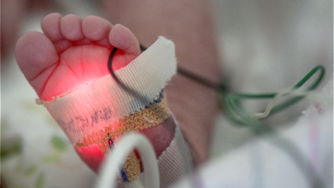What is a Neonatologist?
It takes a strong person, but neonatologists are essential to infant survival.

Premature births are terrifying for a mother. How a premature birth is handled can literally mean life or death for the infant. Doctors responsible for overseeing such a traumatic event are referred to as neonatologists.
Medical students that pursue neonatology need to have nerves of steel. Otherwise the deep lows will eventually outweigh all of the triumphant success stories.
That said, if you are ready to bring joy into the world of a panic-stricken couple in their time of need, a career in neonatology may be for you. To get a better idea of what lies ahead, read on.
More Than Preemies
In general, neonatologists care for infants that are having trouble adjusting to life outside the womb. A common case is when an infant is born before the 37th week of the pregnancy. Also known as a preemie, or premie, these little ones typically survive if they are born after the 27th week.
In that scenario, a Neonatologist’s responsibility is to do everything in their power to ensure the infant’s survival.
Neonatologists are also called in for issues related to infant health. They diagnose and treat the following issues:
- low birth weight
- birth defects
- undeveloped organs
- lack of oxygen
When ensuring the infant's survival, neonatologists see their patients in the Neonatal Intensive Care Unit, or NICU. Preemies and ill babies typically stay in the NICU under the neonatologist's watchful eye until they are able to join the others.
How Neonatalogists Find Work
There are plenty of different ways a neonatologist can be assigned to a medical case. For example, if an obstetrician finds out a baby has an issue before birth, they will request a neonatologist. Those that receive the call are expected to be at the baby's delivery to provide the delicate care the infant needs to survive.
That said, at most hospitals a neonatologist must be present in the NICU at all times. Due to this, medical students interested in entering the field should anticipate being on-call the majority of the time.
A More In-Depth Look
Infants that are born before the 37th week are usually underdeveloped in some way.
Due to this, constant care must be provided to ensure the little one continues to grow and develop safely.
Depending on the infant’s development, they may need you to provide one or more of the following during their stay in the NICU.
- Nutrition
- Medication
- Oxygen
- Cycle and oxygenate blood
Emotional Resolve
Administering these vital treatments improves the odds of an infant making it to their first birthday. If that thought made you teary-eyed, remember, neonatologists have to be emotionally strong.
Neonatologists need to be able to detach from the situation in order to stay professional and mentally capable of handling these scenarios. The mental aspect is especially important when dealing with parents who may be distraught and irrational.
That said, medical students capable of giving 100% during emotionally-overwhelming situations, regardless of the odds, should pursue a career as a Neonatologist.

